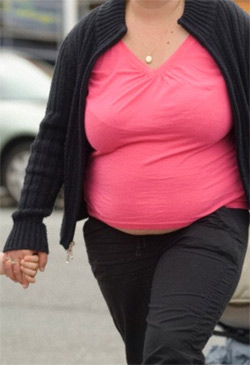fitness news
![]() ,
,![]()
Font size Weight Management
Underestimating size can lead to tolerance of obesity
– Reported September 20, 2014

Size is relative, especially to people who tend to be on the heavy side. Researchers at the Columbia University Medical Center in the US found that seven in every ten obese adults underestimate how much someone weighs. People of normal weight make this mistake much less often. Mothers of overweight or obese children also tend to misjudge their children’s size, as youngsters misjudge their obese mothers’ size, says lead author Tracy Paul, now at Weill-Cornell Medical College, in a study¹ in the Journal of General Internal Medicine², published by Springer.
If abnormal weight among children is not addressed in a timely way, it can set in motion life-long distorted perceptions of what is acceptable and healthy, and contribute to adolescent and adult obesity. However, prevention efforts are often challenging because many parents of obese children do not try to prevent their children from becoming obese. Paul’s team tested the assumption that this happens because parents often do not perceive weight as a problem, or do not see the link between obesity and health problems. They therefore queried 253 mothers and their children at an outpatient pediatric dental clinic at Columbia University Medical Center about their perceptions of what healthy and ideal body sizes are. Most participants were Hispanic (82.2 percent).
The researchers found that 71.4 percent of obese adults and 35.1 percent of overweight adults underestimated size, compared to 8.6 percent of people of normal weight. Among overweight and obese children, 86.3 percent and 62.3 percent respectively think they weigh less than they actually do, versus 14.9 percent of children of normal weight. Mothers of overweight children had a particularly poor showing. Eighty percent of them underestimated their child’s weight, compared to 7.1 percent of mothers with normal weight children and 23.1 percent of mothers with obese offspring. Children with obese mothers, too, found weight difficult to judge, with the vast majority of them incorrectly classifying an adult’s size.
People who design and implement programs aimed at reversing obesity trends should note that family members often struggle to make an accurate call on weight matters, says Paul. She underscores the importance of recognizing high-risk and understudied sub-groups, because age, ethnicity, and socioeconomic status all influence childhood obesity.
“The failure to recognize abnormal weight occurs more often among overweight or obese mothers and children. Children of obese mothers often also underestimate adult size, suggesting that tolerance of being overweight is common among children exposed to obese parents,” summarizes Paul. “This is worrying, as flawed weight perception impedes one’s ability to recognize obesity and its risks as a personal health issue.”
http://www.medicalnewstoday.com/